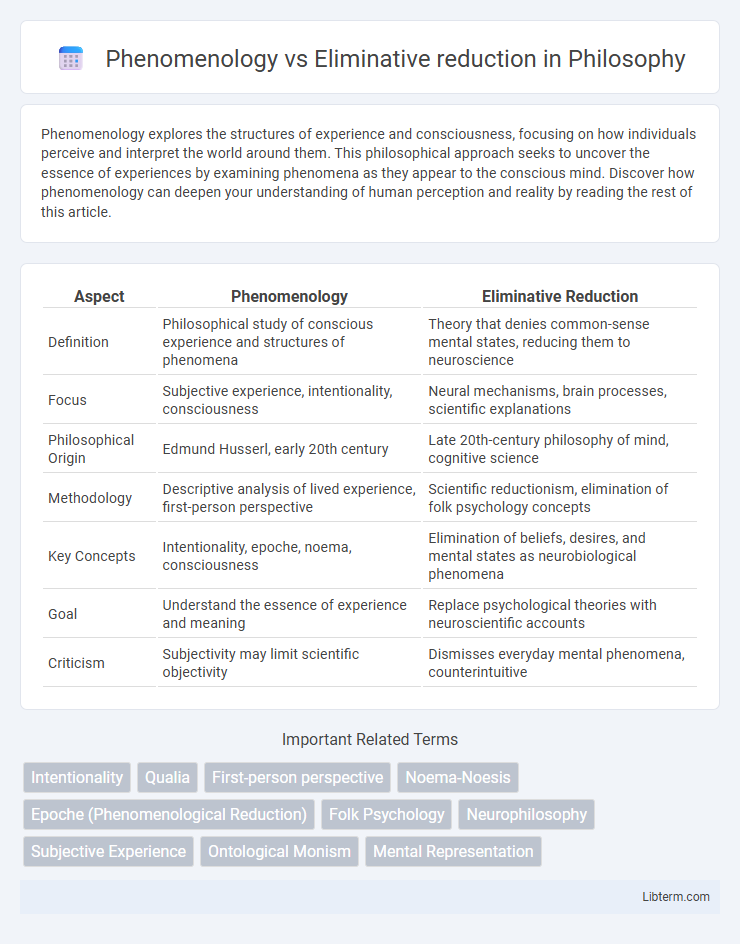Phenomenology explores the structures of experience and consciousness, focusing on how individuals perceive and interpret the world around them. This philosophical approach seeks to uncover the essence of experiences by examining phenomena as they appear to the conscious mind. Discover how phenomenology can deepen your understanding of human perception and reality by reading the rest of this article.
Table of Comparison
| Aspect | Phenomenology | Eliminative Reduction |
|---|---|---|
| Definition | Philosophical study of conscious experience and structures of phenomena | Theory that denies common-sense mental states, reducing them to neuroscience |
| Focus | Subjective experience, intentionality, consciousness | Neural mechanisms, brain processes, scientific explanations |
| Philosophical Origin | Edmund Husserl, early 20th century | Late 20th-century philosophy of mind, cognitive science |
| Methodology | Descriptive analysis of lived experience, first-person perspective | Scientific reductionism, elimination of folk psychology concepts |
| Key Concepts | Intentionality, epoche, noema, consciousness | Elimination of beliefs, desires, and mental states as neurobiological phenomena |
| Goal | Understand the essence of experience and meaning | Replace psychological theories with neuroscientific accounts |
| Criticism | Subjectivity may limit scientific objectivity | Dismisses everyday mental phenomena, counterintuitive |
Introduction to Phenomenology and Eliminative Reduction
Phenomenology, founded by Edmund Husserl, emphasizes the direct examination of conscious experience to uncover the structures of phenomena as they appear to consciousness. In contrast, eliminative reduction, rooted in the philosophy of mind and cognitive science, argues for the abandonment of folk psychological concepts like beliefs and desires in favor of neuroscientific explanations. While phenomenology seeks to describe subjective experience without reduction, eliminative reduction aims to replace it with objective neuroscientific accounts.
Defining Phenomenology: Core Concepts and Principles
Phenomenology centers on the systematic study of conscious experience, emphasizing intentionality, where consciousness is always directed toward an object. Core principles include epoche, the suspension of judgment to examine phenomena as they appear, and the focus on the lived experience, revealing the structures of meaning and essence. This approach contrasts with eliminative reductionism, which denies the existence of certain mental states, whereas phenomenology seeks to describe and understand them from a first-person perspective.
Understanding Eliminative Reduction: Key Ideas and Arguments
Eliminative reduction argues that common-sense psychological concepts like beliefs and desires are fundamentally flawed and should be replaced by neuroscientific explanations of brain processes. It emphasizes the need to eliminate subjective mental states in favor of objective neurobiological mechanisms, challenging phenomenology's focus on first-person experiences. Key arguments highlight that advances in cognitive science will render folk psychology obsolete, prioritizing empirical evidence over introspective reports.
Historical Background and Philosophical Context
Phenomenology emerged in the early 20th century, founded by Edmund Husserl as a method to study conscious experience by describing phenomena as they are perceived. In contrast, eliminative reduction, rooted in mid-20th century philosophy of mind and neuroscience, argues that common-sense psychological concepts like beliefs and desires will be replaced by neuroscientific explanations. These approaches reflect contrasting historical contexts: phenomenology aligns with Continental philosophy's focus on subjective experience, while eliminative reduction stems from analytic philosophy's commitment to scientific realism and the rejection of folk psychology.
Major Proponents of Phenomenology and Eliminative Reduction
Major proponents of phenomenology include Edmund Husserl, who founded the movement emphasizing the study of consciousness and experience from a first-person perspective, and Martin Heidegger, who expanded its scope to existential and ontological themes. In contrast, eliminative reduction is championed by philosophers like Paul Churchland and Patricia Churchland, who argue that common-sense mental states and folk psychology should be eliminated in favor of neuroscientific explanations. These figures engage in a fundamental debate over whether subjective experiences or neurobiological processes provide the most accurate account of the mind.
Methodological Approaches: Comparing Phenomenology and Eliminative Reduction
Phenomenology employs a first-person perspective emphasizing subjective experience and intentionality to describe consciousness without presuppositions, while eliminative reduction applies a third-person scientific methodology aiming to replace folk psychological concepts with neurobiological explanations. Phenomenology uses descriptive analysis to uncover the structures of experience, whereas eliminative reduction relies on empirical evidence and neurocognitive data to eliminate mentalistic concepts deemed theoretically obsolete. This contrast highlights phenomenology's commitment to subjective meaning and eliminative reduction's focus on objective, biologically grounded accounts.
Consciousness and Subjectivity: Divergent Perspectives
Phenomenology emphasizes the first-person experience and the rich, subjective nature of consciousness, asserting that subjective phenomena are irreducible and essential for understanding mind. Eliminative reduction, rooted in neuroscience, argues that common-sense mental states like beliefs and sensations are folk psychological constructs that will ultimately be replaced by neurobiological explanations, denying the ontological status of subjective experiences. These divergent perspectives highlight a fundamental clash: phenomenology prioritizes lived experience and intentionality, while eliminative materialism focuses on objective, neuroscientific accounts that eliminate traditional subjective concepts.
Critiques and Controversies in Contemporary Philosophy
Phenomenology faces critiques regarding its subjective emphasis, which some argue lacks empirical rigor and objective validation compared to scientific approaches. Eliminative reduction is controversial for denying the existence of common mental phenomena like beliefs and desires, challenging traditional understandings of consciousness and cognition. Both approaches provoke intense debate in contemporary philosophy over the nature of mind, the validity of introspective methods, and the feasibility of reducing mental states to neurobiological processes.
Implications for Cognitive Science and Mind Studies
Phenomenology emphasizes first-person subjective experience, offering rich qualitative insights that challenge purely reductionist accounts in cognitive science. Eliminative reduction advocates for replacing folk-psychological concepts with neuroscientific terms, aiming to eradicate subjective notions deemed scientifically invalid. Their interplay impacts mind studies by provoking debates on the validity of introspective data versus objective neurobiological explanations, shaping methodologies and theories in consciousness research.
Conclusion: Future Directions in Mind and Consciousness Research
Phenomenology emphasizes first-person subjective experience as essential for understanding consciousness, advocating detailed qualitative analysis of mental phenomena. In contrast, eliminative reduction aims to replace folk psychological concepts with neuroscientific explanations, suggesting traditional mental states may be illusory. Future research in mind and consciousness will likely integrate phenomenological insights with neuroscientific methods, fostering interdisciplinary approaches that reconcile subjective experience with objective brain processes.
Phenomenology Infographic

 libterm.com
libterm.com